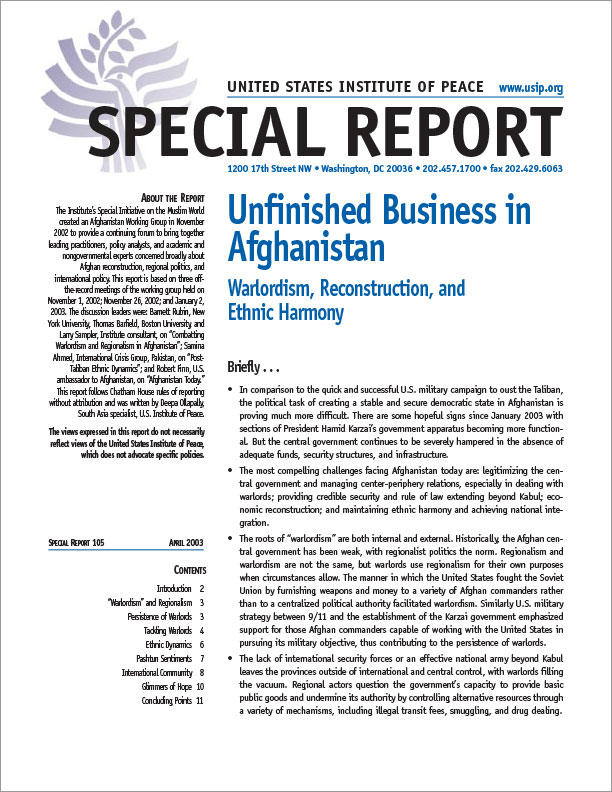Unfinished Business in Afghanistan: Warlordism, Reconstruction, and Ethnic Harmony

Summary
- In comparison to the quick and successful U.S. military campaign to oust the Taliban, the political task of creating a stable and secure democratic state in Afghanistan is proving much more difficult. There are some hopeful signs since January 2003 with sections of President Hamid Karzai's government apparatus becoming more functional. But the central government continues to be severely hampered in the absence of adequate funds, security structures, and infrastructure.
- The most compelling challenges facing Afghanistan today are: legitimizing the central government and managing center-periphery relations, especially in dealing with warlords; providing credible security and rule of law extending beyond Kabul; economic reconstruction; and maintaining ethnic harmony and achieving national integration.
- The roots of "warlordism" are both internal and external. Historically, the Afghan central government has been weak, with regionalist politics the norm. Regionalism and warlordism are not the same, but warlords use regionalism for their own purposes when circumstances allow. The manner in which the United States fought the Soviet Union by furnishing weapons and money to a variety of Afghan commanders rather than to a centralized political authority facilitated warlordism. Similarly U.S. military strategy between 9/11 and the establishment of the Karzai government emphasized support for those Afghan commanders capable of working with the United States in pursuing its military objective, thus contributing to the persistence of warlords.
- The lack of international security forces or an effective national army beyond Kabul leaves the provinces outside of international and central control, with warlords filling the vacuum. Regional actors question the government's capacity to provide basic public goods and undermine its authority by controlling alternative resources through a variety of mechanisms, including illegal transit fees, smuggling, and drug dealing.
- The ethnic dynamics, while potentially volatile, continue to be reasonably well balanced. U.S. military action affected the political balance and tilted power away from the Pashtuns, who find this difficult to accept. But the Pashtun community also suffers internal divisions based on region, ideology, and leadership personality. The victory of religious (as opposed to nationalist) Pashtun parties in the October 2002 elections across the border in Pakistan raises concern about its implications for Afghanistan. U.S. intervention in Iraq may also mobilize Pashtun sentiment against American involvement in Afghanistan and increase attacks against U.S. troops.
- Afghanistan's future is going to be significantly determined by how much priority the country will receive in the short and medium run on the international community's agenda. So far, international assistance has tended to be long on promises, short on delivery. This undercuts U.S. credibility in particular since the United States is seen as President Karzai's strongest ally. Unless international attention can be maintained on peace and reconstruction in Afghanistan even as other issues threaten to overwhelm the international agenda, there is a danger that while the battle has been won, the war will be lost. The flare-ups between U.S. troops and remnants of the Taliban or al Qaeda fighters since late January 2003 serve as a sharp reminder that Afghanistan remains at risk.
About the Report
The Institute's Special Initiative on the Muslim World created an Afghanistan Working Group in November 2002 to provide a continuing forum to bring together leading practitioners, policy analysts, and academic and nongovernmental experts concerned broadly about Afghan reconstruction, regional politics, and international policy. This report is based on three off-the-record meetings of the working group held on November 1, 2002; November 26, 2002; and January 2, 2003. The discussion leaders were: Barnett Rubin, New York University, Thomas Barfield, Boston University, and Larry Sampler, Institute consultant, on "Combatting Warlordism and Regionalism in Afghanistan"; Samina Ahmed, International Crisis Group, Pakistan, on "Post-Taliban Ethnic Dynamics"; and Robert Finn, U.S. ambassador to Afghanistan, on "Afghanistan Today." This report follows Chatham House rules of reporting without attribution and was written by Deepa Ollapally, South Asia specialist, U.S. Institute of Peace.
The views expressed in this report do not necessarily reflect views of the United States Institute of Peace, which does not advocate specific policies.



